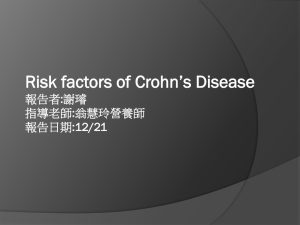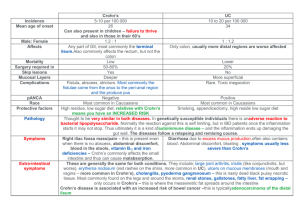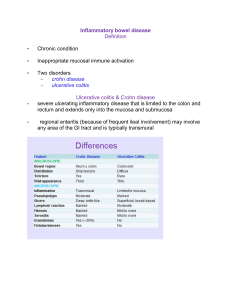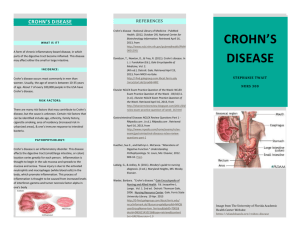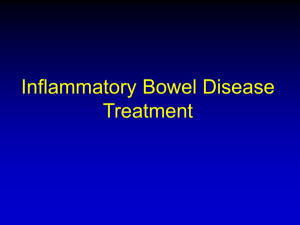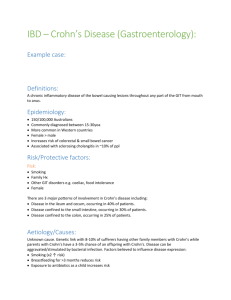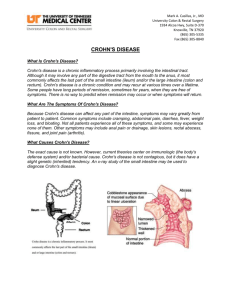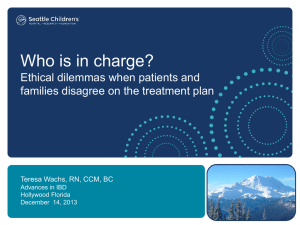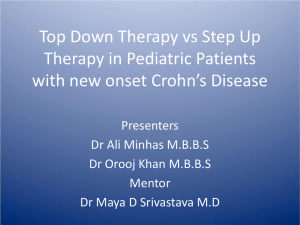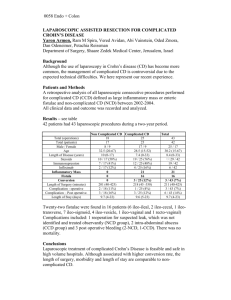LISTENING ONE You are going to listen to a talk given by a doctor
advertisement
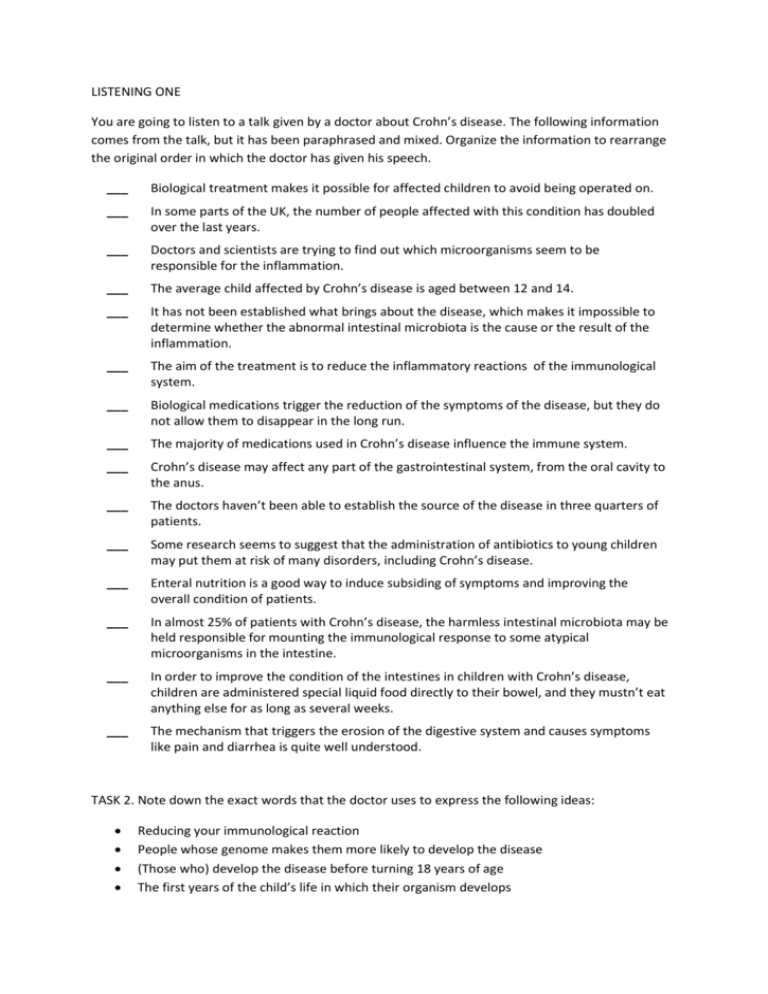
LISTENING ONE You are going to listen to a talk given by a doctor about Crohn’s disease. The following information comes from the talk, but it has been paraphrased and mixed. Organize the information to rearrange the original order in which the doctor has given his speech. ___ Biological treatment makes it possible for affected children to avoid being operated on. ___ In some parts of the UK, the number of people affected with this condition has doubled over the last years. ___ Doctors and scientists are trying to find out which microorganisms seem to be responsible for the inflammation. ___ The average child affected by Crohn’s disease is aged between 12 and 14. ___ It has not been established what brings about the disease, which makes it impossible to determine whether the abnormal intestinal microbiota is the cause or the result of the inflammation. ___ The aim of the treatment is to reduce the inflammatory reactions of the immunological system. ___ Biological medications trigger the reduction of the symptoms of the disease, but they do not allow them to disappear in the long run. ___ The majority of medications used in Crohn’s disease influence the immune system. ___ Crohn’s disease may affect any part of the gastrointestinal system, from the oral cavity to the anus. ___ The doctors haven’t been able to establish the source of the disease in three quarters of patients. ___ Some research seems to suggest that the administration of antibiotics to young children may put them at risk of many disorders, including Crohn’s disease. ___ Enteral nutrition is a good way to induce subsiding of symptoms and improving the overall condition of patients. ___ In almost 25% of patients with Crohn’s disease, the harmless intestinal microbiota may be held responsible for mounting the immunological response to some atypical microorganisms in the intestine. ___ In order to improve the condition of the intestines in children with Crohn’s disease, children are administered special liquid food directly to their bowel, and they mustn’t eat anything else for as long as several weeks. ___ The mechanism that triggers the erosion of the digestive system and causes symptoms like pain and diarrhea is quite well understood. TASK 2. Note down the exact words that the doctor uses to express the following ideas: Reducing your immunological reaction People whose genome makes them more likely to develop the disease (Those who) develop the disease before turning 18 years of age The first years of the child’s life in which their organism develops The last part of the digestive system The intestinal microbiota The very basic reason for something To avoid operation We don’t know the cause of Used mainly in children KEY – TASK 1 1. The average child affected by Crohn’s disease is aged between 12 and 14. 2. The mechanism that triggers the erosion of the digestive system and causes symptoms like pain and diarrhea is quite well understood. 3. In almost 25% of patients with Crohn’s disease, the harmless intestinal microbiota may be held responsible for mounting the immunological response to some atypical microorganisms in the intestine. 4. The doctors haven’t been able to establish the source of the disease in three quarters of patients. 5. Doctors and scientists are trying to find out which microorganisms seem to be responsible for the inflammation. 6. It has not been established what brings about the disease, which makes it impossible to determine whether the abnormal intestinal microbiota is the cause or the result of the inflammation. 7. Some research seems to suggest that the administration of antibiotics to young children may put them at risk of many disorders, including Crohn’s disease. 8. In some parts of the UK, the number of people affected with this condition has doubled over the last years. 9. Crohn’s disease may affect any part of the gastrointestinal system, from the oral cavity to the anus. 10. The aim of the treatment is to reduce the inflammatory reactions of the immunological system. 11. In order to improve the condition of the intestines in children with Crohn’s disease, children are administered special liquid food directly to their bowel, and they mustn’t eat anything else for as long as several weeks. 12. Enteral nutrition is a good way to induce subsiding of symptoms and improving the overall condition of patients. 13. The majority of medications used in Crohn’s disease influence the immune system. 14. Biological treatment makes it possible for affected children to avoid being operated on. 15. Biological medications trigger the reduction of the symptoms of the disease, but they do not allow them to disappear in the long run. KEY – TASK 2 Reducing your immunological reaction – suppressing your immune response People whose genome makes them more likely to develop the disease – genetically predisposed individuals Those who develop the disease before turning 18 years of age – patients present under the age of 18 The first years of the child’s life in which their organism develops – early formative years of life The last part of the digestive system – bottom end The intestinal microbiota – gut flora The very basic reason for something – underlying cause To avoid operation – to postpone (invasive) surgery We don’t know the cause of – we’re not clear what the trigger is Used mainly in children - predominantly
